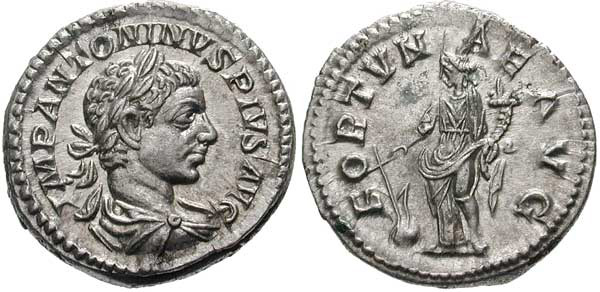|
222
__NOTOC__ Year 222 ( CCXXII) was a common year starting on Tuesday of the Julian calendar. In the Roman Empire, it was known as the Year of the Consulship of Antoninus and Severus (or, less frequently, year 975 ''Ab urbe condita''). The denomination 222 for this year has been used since the early medieval period, when the Anno Domini calendar era became the prevalent method in Europe for naming years. Events By place Roman Empire * March 13 – Emperor Elagabalus is assassinated, along with his mother, Julia Soaemias, by the Praetorian Guard during a revolt. Their mutilated bodies are dragged through the streets of Rome before being thrown into the Tiber. * Alexander Severus succeeds Elagabalus. He is only 13 years old; his mother, Julia Avita Mamaea, governs the Roman Empire with the help of Domitius Ulpianus and a council composed of 16 senators. China * Battle of Xiaoting/Yiling: The Chinese state of Shu Han is defeated by Eastern Wu. By topic Comm ... [...More Info...] [...Related Items...] OR: [Wikipedia] [Google] [Baidu] |
Elagabalus
Marcus Aurelius Antoninus (born Sextus Varius Avitus Bassianus, 204 – 13 March 222), better known by his posthumous nicknames Elagabalus ( ) and Heliogabalus ( ), was Roman emperor from 218 to 222, while he was still a teenager. His short reign was notorious for religious controversy and alleged sexual debauchery. A close relative to the Severan dynasty, he came from a prominent Syrian Arabs, Syrian Arab family in Emesa (Homs), Roman Syria, Syria, where he served as the head priest of the Solar deity, sun god Elagabalus (deity), Elagabal from a young age. After the death of his cousin, the emperor Caracalla, Elagabalus was raised to the principate at 14 years of age in an army revolt instigated by his grandmother Julia Maesa against Caracalla's short-lived successor, Macrinus. He only posthumously became known by the Latinised name of his god. Elagabalus is largely known from accounts by the contemporary senator Cassius Dio who was strongly hostile to him, Herodian, who lik ... [...More Info...] [...Related Items...] OR: [Wikipedia] [Google] [Baidu] |
Eastern Wu
Wu (Chinese language, Chinese: 吳; pinyin: ''Wú''; Middle Chinese *''ŋuo'' < Eastern Han Chinese: ''*ŋuɑ''), known in historiography as Eastern Wu or Sun Wu, was a Dynasties of China, dynastic state of China and one of the three major states that competed for supremacy over China in the Three Kingdoms period. It previously existed from 220 to 222 as a vassal kingdom nominally under Cao Wei, its rival state, but declared complete independence in November 222. It was elevated to an empire in May 229 after its founding ruler, Sun Quan (Emperor Da), declared himself Emperor of China, emperor. The name "Wu" was derived from the place it was based in—the Jiangnan (Yangtze River Delta) region, which was also historically known as "Wu (region), Wu". It was called "Dong Wu" ("Eastern Wu") or "Sun Wu" by historians to distinguish it from other Chinese historical states with similar names in that region, such as the Wu (state), Wu state in the Spring and Autumn period and the Wuyu ... [...More Info...] [...Related Items...] OR: [Wikipedia] [Google] [Baidu] |
Alexander Severus
Marcus Aurelius Severus Alexander (1 October 208 – March 235), also known as Alexander Severus, was Roman emperor from 222 until 235. He was the last emperor from the Severan dynasty. Alexander took power in 222, when he succeeded his slain cousin Elagabalus at the age of 13. Alexander himself was eventually assassinated in 235, and his death marked the beginning of the events of the Crisis of the Third Century, which included nearly fifty years of civil war, foreign invasion, and the collapse of the monetary economy. Alexander was the heir to his cousin, the 18-year-old Emperor Elagabalus. The latter had been murdered along with his mother Julia Soaemias by his own guards, who, as a mark of contempt, had their remains cast into the Tiber river. Alexander and his cousin were both grandsons of Julia Maesa, who was the sister of empress Julia Domna and had arranged for Elagabalus's acclamation as emperor by the Legio III Gallica, Third Gallic Legion. Alexander's 13-year reign wa ... [...More Info...] [...Related Items...] OR: [Wikipedia] [Google] [Baidu] |
Battle Of Xiaoting
The Battle of Xiaoting (猇亭之戰), also known as the Battle of Yiling and the Battle of Yiling and Xiaoting, was fought between the states of Shu Han and Eastern Wu, in the years 221 and 222 during the early Three Kingdoms period of China. The battle is significant because Wu was able to turn the situation from a series of initial losses into a defensive stalemate, before proceeding to win a decisive victory over Shu. The Wu victory halted the Shu invasion and preceded the death of Liu Bei, Shu's founding emperor. Background In late 219, Lü Meng, a general serving under Sun Quan, led an army to invade Liu Bei's territories in southern Jing Province. Guan Yu, Liu Bei's general in charge of guarding Jing Province, was away at the Battle of Fancheng and did not know about the invasion until after he returned from his Pyrrhic victory at Fancheng. He was surrounded by Sun Quan's forces in Maicheng (麥城; in Dangyang, Hubei), captured in an ambush while trying to break out ... [...More Info...] [...Related Items...] OR: [Wikipedia] [Google] [Baidu] |



